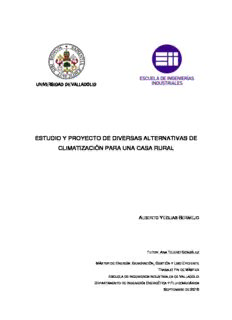
estudio y proyecto de diversas alternativas de climatización para una casa rural PDF
Preview estudio y proyecto de diversas alternativas de climatización para una casa rural
UNIVERSIDAD DE VALLADOLID ESTUDIO Y PROYECTO DE DIVERSAS ALTERNATIVAS DE CLIMATIZACIÓN PARA UNA CASA RURAL ALBERTO YEGUAS BERMEJO TUTOR: ANA TEJERO GONZÁLEZ MÁSTER DE ENERGÍA: GENERACIÓN, GESTIÓN Y USO EFICIENTE TRABAJO FIN DE MÁSTER ESCUELA DE INGENIEROS INDUSTRIALES DE VALLADOLID DEPARTAMENTO DE INGENIERÍA ENERGÉTICA Y FLUIDOMECÁNICA SEPTIEMBRE DE 2016 ESTUDIO Y PROYECTO DE DIVERSAS ALTERNATIVAS DE CLIMATIZACIÓN PARA UNA CASA RURAL ALBERTO YEGUAS BERMEJO TUTOR: ANA TEJERO GONZÁLEZ MÁSTER DE ENERGÍA: GENERACIÓN, GESTIÓN Y USO EFICIENTE TRABAJO FIN DE MÁSTER ESCUELA DE INGENIEROS INDUSTRIALES DE VALLADOLID DEPARTAMENTO DE INGENIERÍA ENERGÉTICA Y FLUIDOMECÁNICA SEPTIEMBRE DE 2016 A mis padres… ESTUDIO Y PROYECTO DE DIVERSAS ALTERNATIVAS DE CLIMATIZACIÓN PARA UNA CASA RURAL TFM MÁSTER DE ENERGÍA: GENERACIÓN, GESTIÓN Y USO EFICIENTE. UVA ALBERTO YEGUAS BERMEJO RESUMEN Actualmente vivimos en un contexto en el que constantemente escuchamos hablar sobre el cambio climático, el deterioro de la capa de ozono o la pérdida de la biodiversidad. Desde que el 11 de diciembre de 1997 se aprobó el Protocolo de Kioto sobre el cambio climático, se inició una etapa de concienciación medioambiental para promover la disminución del consumo de combustibles fósiles y una mayor utilización de energías renovables. Se han fijado ambiciosos objetivos europeos para 2020, 2030 y 2050 y, aunque los balances obtenidos están siendo positivos, aún están lejos de los objetivos iniciales. Teniendo en cuenta el elevado consumo energético que supone el sector residencial, es fundamental tomar las medidas necesarias durante la etapa de proyecto para reducir la demanda energética y limitar el consumo energético de los edificios residenciales. Desde el punto de vista del proyecto de instalaciones, la climatización es el servicio que genera un mayor consumo y, por tanto, el más susceptible de mejoras. El objetivo general del presente trabajo es seleccionar los sistemas de climatización más adecuados y eficientes para un caso de estudio concreto. Para ello se analizarán, valorarán y seleccionarán los sistemas más adecuados (sistemas de calefacción; sistemas de generación de calor, producción de ACS y recuperador de calor; control de la ventilación y recuperación de calor; regulación y control), y se estudiará su rentabilidad y el cumplimiento del CTE. ABSTRACT Nowadays we live in a context in which we constantly hear about climate change, the deterioration in the ozone layer or the loss of biodiversity. Since the Kyoto Protocol was adopted on 11 December 1997, it was initiated a time of environmental awareness to promote the reduction of fossil fuel consumption and an increased use of renewable energy. There have been set ambitious European objectives for 2020, 2030 and 2050 and, although the obtained balances are positive, they are still far from the initial aims. Taking into account the high energy consumption involved in the residential sector, it is essential to take the necessary steps during the project stage to reduce the energy demand and to limit the energy consumption of the residential buildings. From the point of view of the installations project, the air conditioning is the system that generates a higher consumption and, therefore, the most capable of improvements. The overall aim of this work is to select the most suitable and efficient systems of air conditioning for a specific case of study. To that end, it will be analysed, evaluated and selected the most suitable systems (systems of heating; systems of generation of heat, hot water production and energy recovery system; ventilation control and heat recovery; regulation and control), and it will be studied its profitability and the compliance of CTE. 3 ESTUDIO Y PROYECTO DE DIVERSAS ALTERNATIVAS DE CLIMATIZACIÓN PARA UNA CASA RURAL TFM MÁSTER DE ENERGÍA: GENERACIÓN, GESTIÓN Y USO EFICIENTE. UVA ALBERTO YEGUAS BERMEJO ÍNDICE Resumen / Abstract PARTE 1: PLANTEAMIENTO 1.1 INTRODUCCIÓN 1.2 OBJETIVOS 1.3 METODOLOGÍA 1.4 PRESENTACIÓN DEL CASO DE ESTUDIO PARTE 2: MARCO TEÓRICO. CONTEXTO ENERGÉTICO 2.1 ENERGÍA Y MEDIO AMBIENTE 2.1.1 HISTORIA DE LA ENERGÍA 2.1.2 FUENTES DE LA ENERGÍA 2.1.3 IMPACTO MEDIOAMBIENTAL DE LA ENERGÍA 2.1.4 CONCIENCIACIÓN SOBRE LA EFICIENCIA ENERGÉTICA 2.1.5 ACUERDOS EUROPEOS CONTRA EL CAMBIO CLIMÁTICO 2.2 EFICIENCIA ENERGÉTICA EN LA EDIFICACIÓN. EL CASO DE ESPAÑA 2.2.1 CONSUMO ENERGÉTICO SECTORIAL EN ESPAÑA 2.2.2 CONSUMO ENERGÉTICO DEL SECTOR RESIDENCIAL 2.2.3 MARCO NORMATIVO DEL SECTOR EDIFICACIÓN 2.2.4 DISEÑO EFICIENTE DE UN EDIFICIO RESIDENCIAL 2.2.5 DISEÑO EFICIENTE DE LAS INSTALACIONES PARTE 3: MARCO TEÓRICO. SISTEMAS DE CLIMATIZACIÓN 3.1 SISTEMAS DE CALEFACCIÓN. ANÁLISIS DE LAS OPCIONES 3.1.1 SISTEMA DE CALEFACCIÓN TODO AGUA 3.1.2 SISTEMA DE CALEFACCIÓN POR AIRE 3.1.3 SISTEMA DE CALEFACCIÓN ELÉCTRICA 3.2 SISTEMAS DE GENERACIÓN DE CALOR, PRODUCCIÓN DE A.C.S Y RECUPERACIÓN DE CALOR. ANÁLISIS DE LAS OPCIONES 3.2.1 TIPOS DE CALDERAS 3.2.2 BOMBA DE CALOR 3.2.3 ENERGÍA SOLAR 4
Description: